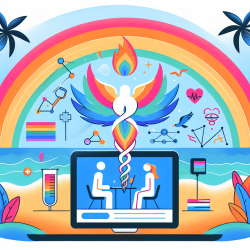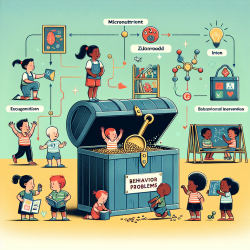The intricate relationship between hearing loss and cognitive decline has been a subject of increasing interest in recent years. A groundbreaking study titled Neurovascular coupling dysfunction associated with cognitive impairment in presbycusis sheds light on how age-related hearing loss, or presbycusis, is linked to cognitive deficits through neurovascular coupling dysfunction. This research offers valuable insights for practitioners looking to enhance their therapeutic approaches and encourages further exploration into this critical area.
Understanding Neurovascular Coupling Dysfunction
Neurovascular coupling refers to the relationship between neuronal activity and cerebral blood flow. In healthy individuals, these processes are tightly linked to ensure adequate oxygen and nutrient supply to active brain regions. However, in patients with presbycusis, this coupling is disrupted, leading to impaired cognitive function.
The study highlights that global neurovascular coupling is significantly lower in individuals with presbycusis compared to healthy controls. This dysfunction is particularly evident within the Papez circuit—a neural pathway crucial for emotional integration and memory processing. The findings suggest that disruptions in this circuit may contribute to the cognitive and emotional challenges faced by those with age-related hearing loss.
Implications for Practitioners
For practitioners working with individuals experiencing hearing loss, these findings underscore the importance of considering cognitive health as part of a comprehensive treatment plan. Here are some ways practitioners can apply these insights:
- Holistic Assessment: Incorporate cognitive assessments into routine evaluations for patients with hearing loss. This approach can help identify early signs of cognitive decline and guide intervention strategies.
- Interdisciplinary Collaboration: Work closely with neurologists and other specialists to develop integrated care plans that address both auditory and cognitive health.
- Patient Education: Educate patients and their families about the connection between hearing loss and cognitive impairment. Empower them with strategies to maintain cognitive health, such as engaging in mental exercises and social activities.
- Research Participation: Encourage participation in research studies aimed at exploring innovative therapies that target neurovascular coupling dysfunction.
The Path Forward: Encouraging Further Research
This study opens new avenues for research into the mechanisms underlying cognitive impairment in presbycusis. By understanding the role of neurovascular coupling dysfunction, researchers can develop targeted interventions that may slow or prevent cognitive decline in individuals with hearing loss.
Practitioners are encouraged to stay informed about ongoing research developments in this field. Engaging with professional networks and attending conferences can provide valuable opportunities to exchange knowledge and collaborate on innovative solutions.
The journey towards improving patient outcomes is a collective effort that requires dedication from practitioners, researchers, and the broader healthcare community. By embracing these findings and fostering a culture of continuous learning, we can make meaningful strides in enhancing the quality of life for individuals affected by presbycusis.
To read the original research paper, please follow this link: Neurovascular coupling dysfunction associated with cognitive impairment in presbycusis.










